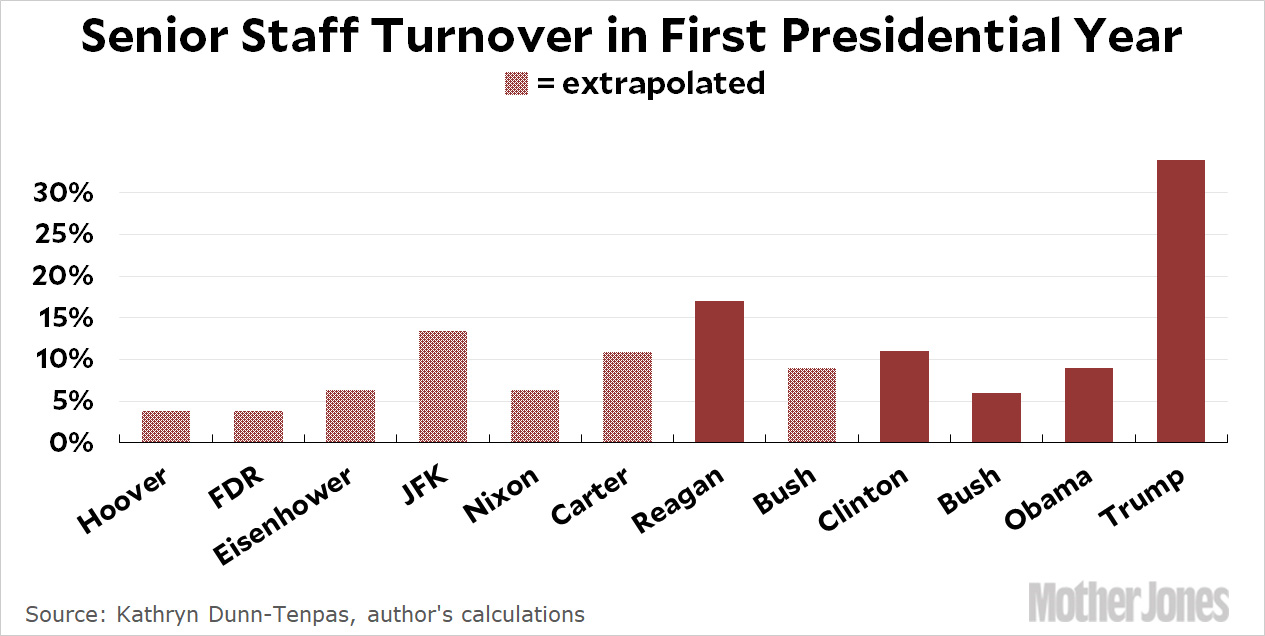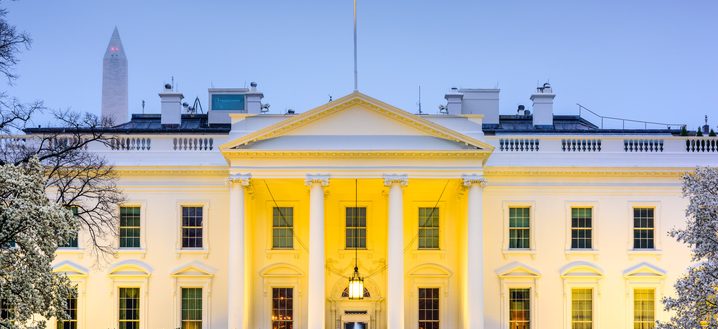Changes in federal government keep coming fast. That’s why GovLoop gives you these monthly recaps of federal news that may affect agency management and employment. If you’ve fallen behind, check out the previous recaps.
By the time you read this, there will undoubtedly be new developments. And, this roundup can’t include everything. The focus is on federal news most relevant to government employees. Check out the linked sources for more information to stay on top of the latest news in government.
1. Record-setting number of departures
As the Trump administration approaches the end of its first year, watchdogs and journalists have begun to take stock of all that has happened. Trump lost 34% of his senior staff so far, far exceeding the rate of his predecessors.
Government shrinkage under Trump isn’t just at the senior staff level. In an important article on the shrinking federal workforce, The Washington Post reported that “all Cabinet departments except Homeland Security, Veterans Affairs and Interior had fewer permanent staff than when Trump took office in January — with most shedding many hundreds of employees.”
As Trump’s 1-year anniversary nears, a new wave of departures has begun. Deputy national security adviser Dina Powell announced she would leave in January, and was reported to be “exiting on good terms with the president.” Deputy chief of staff Rick Dearborn said he would resign in the new year.
Omarosa Manigault-Newman, director of communications for the Office of Public Liaison, made a sudden departure. The White House said she resigned, she said she left voluntarily, and sources told reporters that Chief of Staff John Kelly fired her. Accounts said Manigault-Newman “reacted angrily” and had to be escorted from the White House. While the Secret Service tweeted it was “not involved in the termination process,” it neither confirmed or denied whether Manigault-Newman had to be physically removed. The Associated Press noted “the White House has lost arguably its most prominent and visible African-American senior staffer.”
Just before the new year, Trump fired all the members of the Presidential Advisory Council on HIV/AIDS , known as PACHA. The White House offered no explanation. The move was criticized for “putting politics before public health.” In December it was revealed that Dan Meyer, director of the Intelligence Community Whistleblowing and Source Protection program, was put on administrative leave in November.
2. Many withdrawn nominations
After Matthew Spencer Peterson was unable to answer basic questions about law during a Senate Judiciary Committee hearing—and the video of the testimony went viral—he withdrew his nomination for federal judge on the U.S. District Court for the District of Columbia.
MUST WATCH: Republican @SenJohnKennedy asks one of @realDonaldTrump’s US District Judge nominees basic questions of law & he can’t answer a single one. Hoo-boy. pic.twitter.com/fphQx2o1rc
— Sheldon Whitehouse (@SenWhitehouse) December 15, 2017
The White House did not move forward with two other highly controversial judicial nominees: Brett Talley and Jeff Mateer. Talley, who has never tried a case in court, was deemed “not qualified” by the American Bar Association and failed to disclose a potential conflict of interest. Mateer admitted to discriminating against people on the basis of their sexual orientation.
Dr. Dean Winslow withdrew from consideration to become assistant secretary of defense for health affairs, the Pentagon’s top health official, after he testified before the Senate that it is “insane” that American civilians can buy semi-automatic assault rifles.
Michael Dourson withdrew his nomination to lead the EPA’s Office of Chemical Safety and Pollution Prevention once it became clear the Senate was likely to reject his nomination because of his conflicts of interest.
The Senate declined to consider the nomination of Kathleen Hartnett Hurst for chair of the EPA’s Council on Environmental Quality. The Trump administration will need decide if it wants to renominate White, who has faced fierce opposition from science groups. Trump will also need to renominate people for other agency positions, including several people up for spots in the Labor Department.
3. Confirmations
The Senate confirmed a slew of nominees to wrap up the end of the year.
Kirstjen Nielsen was confirmed as secretary of the Department of Homeland Security. DHS acting secretary Elaine Duke will stay on as deputy secretary.
For the Department of Defense, the Senate confirmed James McPherson as Army general counsel; Bruce Jette as Army acquisition executive; John Roth as assistant secretary for financial management at the Air Force; Thomas Harker, assistant secretary for financial management and comptroller of the Navy; Robert Storch as inspector general for the National Security Agency (NSA); Owen West as assistant secretary for special operations; and Randall Schriver as assistant secretary for Asian-Pacific affairs.
Confirmed for the State Department were Christopher Ashley Ford as assistant secretary for international security and non-proliferation; Jennifer Gillian Newstead, who helped draft the Patriot Act, as legal adviser; and Mary Kirtley Waters as assistant secretary for legislative affairs.
Joseph Balash was confirmed as assistant secretary for land and minerals management at the Interior Department despite concerns over his “past efforts to unlock the Arctic National Wildlife Refuge for minerals exploration.” The Senate also confirmed Timothy Petty as the Interior’s assistant secretary for water and science; Linda Capuano to run the Energy Information Administration at the Energy Department; and John Vonglis as chief financial officer of the Energy Department.
For the Environmental Protection Agency (EPA), the Senate approved David Ross as assistant administrator for the Office of Water; Matt Leopold as general counsel; and Susan Parker Bodine as assistant administrator of the Office of Enforcement and Compliance Assurance.
4. Even more confirmations
Confirmed to join the Labor Department are Preston Rutledge as assistant secretary of labor for the Employee Benefits Security Administration; Katherine Brunett McGuire as assistant secretary of labor for congressional and intergovernmental affairs; and Kate O’Scannalain as solicitor of labor, the Labor Department’s top lawyer.
For the Department of Housing and Urban Development (HUD), the Senate approved Irving Dennis as chief financial officer; Leonard Wolfson as assistant secretary for congressional and intergovernmental relations; Suzanne Israel Tufts as assistant secretary for administration; and J. Paul Compton as general counsel.
Four new members were confirmed to board positions for the Tennessee Valley Authority. The Times Free Press noted that “all four new board members are white males and most have business backgrounds.”
Also confirmed: Douglas Webster as chief financial officer and Johnny Collett as assistant secretary for special education and rehabilitative services at the Department of Education; Brock Bierman as assistant administrator for United States Agency for International Development (USAID); Emily Webster Murphy as administrator of the General Services Administration; Robert Jackson and Hester Maria Peirce as Securities and Exchange Commission (SEC) commissioners; Robert Charrow as Health and Human Services (HHS) general counsel; Chris Caldwell as federal co-chairperson of the Delta Regional Authority; and Jon Rychalski as chief financial officer for Veterans Affairs.
5. Agency issues
December seemed as filled with agency drama as it was with drummers drumming, pipers piping, and lords a-leaping. So much happened that could affect government employees that there isn’t space to go into detail about it all. Here are a few highlights (or lowlights, depending on your point of view):
- After Trump said the FBI’s reputation is in “tatters,” FBI director Christopher Wray defended the agency’s employees and the “professionalism and dedication to justice demonstrated around the bureau.”
- NASA hasn’t had a formal administrator for nearly an entire year, the longest it has been without someone in that key leadership role.
- FCC Commissioner Jessica Rosenworcel accused her agency of withholding evidence of fraud related to comments submitted to the FCC about net neutrality.
- The EPA reportedly hired a company to look for information that could undermine employees who criticize the agency, administrator Scott Pruitt, and the Trump administration.
- A federal judge ruled that the government must allow transgender individuals to enlist in the military beginning on January 1, 2018, despite Trump’s opposition.
- Leaders at the EPA and the Interior Department are reportedly rerouting or slowing down Freedom of Information Act (FOIA) requests, possibly in order to withhold information from the public, the media, and Congress.
- The EPA claimed that its internal Superfund Task Force created no other documents while developing an intricate plan to revamp the country’s clean up of polluted sites.
- The White House has “temporarily” shut down its We The People petition tool, after not responding to any of the 17 petitions that received the required 100,000 signatures to get an official response. The administration promised to relaunch the tool in January 2018.
- The Office of Management and budget missed a December 1 deadline to issue a decision on collecting data on race and ethnicity. The Department of Justice also asked the Census Bureau to include a citizenship question on the 2020 census.
Note: This article not an opinion about or endorsement of any policies, regulations, or orders, nor of the behaviors of elected officials, political appointees, government employees, other individuals, organizations, or agencies.
What other federal government developments have caught your attention? What stories are you and your colleagues talking about at the office? Share your thoughts in the comments.
Lauren Girardin is a marketing and communications consultant, writer, and speaker based in San Francisco. She helps organizations engage their communities and tell their stories. Her website is laurengirardin.com and you can connect with her on Twitter at @girardinl.





Leave a Reply
You must be logged in to post a comment.